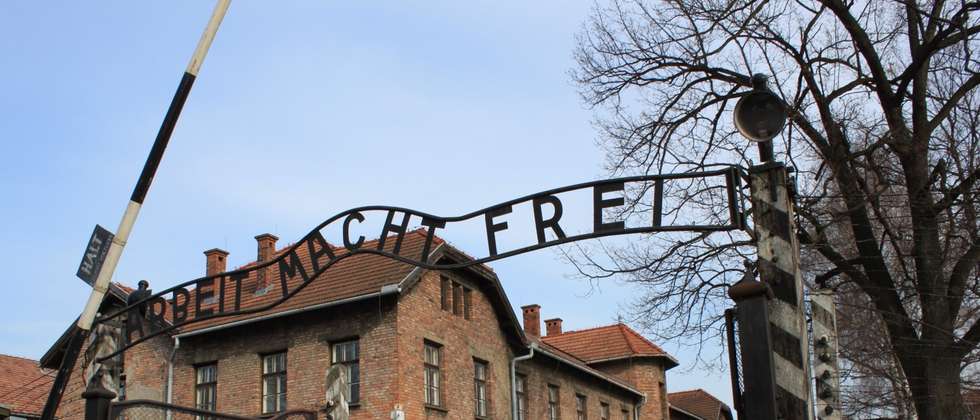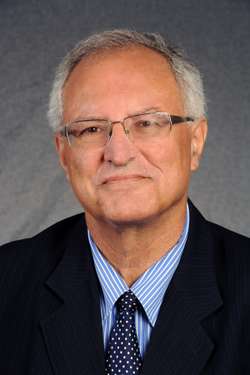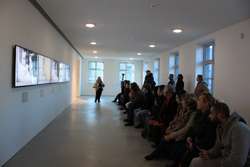Interview with the al-Quds University professor who caused an uproar by taking a group of Palestinian students to Auschwitz.
By Ron Friedman
Few people who visit Auschwitz are unmoved by evidence of the Nazi killing machine that so efficiently murdered some one million people during World War II.
Professor Mohammed Dajani is no exception.

Professor Mohammed Dajani at the entrance to Auschwitz ( Courtesy )
Despite having grown up in a Palestinian society rife with Holocaust denial, where many believe that acknowledging the Jewish tragedy means surrendering their own narrative of victimhood, a visit to the Polish* death camp (It was NOT a ‘Polish camp’, it was a NAZI Death Camp established by the German Nazis in Poland – correction by IsraelandStuff) in 2011 set him on the path to championing Holocaust education.
“I was brought up in a culture of denial of the Holocaust. It was a taboo and I never studied about it in school or the university. Whatever I knew about it was vague… it was either exaggerated or it was part of the atrocities within the Second World War,” recalled Dajani in an interview in his home-office in the Eastern Jerusalem neighborhood of Beit Hanina. “Basically, when you come from that culture and then you go on such a visit, it is a cognitive dissonance.”
Dajani believes that it is only through education and understanding of the other — even of enemies — that Palestinians can break out of their own sense of victimization.
“I used to teach about the Nakba and there are many thousands of Palestinians teaching about the Nakba. But there isn’t one single Palestinian teaching about the Holocaust. And so that’s why I feel like I need to fill that gap,” said the soft-spoken professor, referring to the Arab term for the tragedy that befell hundreds of thousands of Arabs who fled or were expelled from their homes when Israel fought its 1948 war of independence.
Dajani found himself at the center of an uproar last month after news emerged that he had led a group of Palestinian students on a tour to Poland as part of a course on reconciliation. More than 70 students sent in applications to join the tour and 27 were selected, most of them graduate students and five doctoral candidates.

Professor Mohammed S. Dajani
“Those with strong ideological backgrounds felt resistance to what they saw and what was happening to them and then they started to rationalize or to find answers unrelated to the realities they were seeing. Others, who did not have that strong ideological background, and who came with an open mind, immediately absorbed the sorrow,” he recounted, describing how one of the girls cried when seeing the mountains of the victims’ discarded belongings.
“They felt extremely depressed and some of them later wrote that they felt a lot of empathy, though asserting that it doesn’t mean that we are giving up our right to our homeland,” said Dajani.
Dajani also noted that it was important for his group to see the many international groups visiting the site and to realize the extent to which the world pays tribute to the memory of the Nazi victims.
The trip to Auschwitz was part of a joint project with Israeli universities, in which Jewish students were taken to visit a Palestinian refugee camp near the West Bank city of Nablus and spoke to victims of the Nakba.
Dajani was careful to stress, however, that there is no comparison between the two peoples’ tragedies.
“The Palestinians look at the small picture. They look at a photo of a Jew in the Nazi camp… and then they start to remember or to impose it on the Palestinians today,” said Dajani. “In learning about the Holocaust, they can see the differences and they can stop comparing as if they are of equal standing.”
It is precisely statements like those that have made Dajani a pariah for many in Palestinian society. He said that most Palestinians, if they acknowledge the Holocaust at all, link it to their own narrative of displacement, claiming that if it hadn’t happened, the world would never have given the Jews a state.
When news of the trip was first reported in the Hebrew media, the Palestinian Al-Quds University, where he teaches, immediately distanced itself from the trip and even asked participants to state in writing that they were coerced into taking part.

Palestinian students visiting in Auschwitz – Photo Courtesy
Dajani himself was subjected to a slew of nasty letters and negative press.
“There was a huge outburst and it touched them [the students.] They were afraid about how people would think of them, how people within their community would see them. So there was a lot of peer pressure on them,” said Dajani.
Despite the backlash, Dajani thought the visit to Poland was worthwhile and said he sees hope in the fact that after the dust settled, some people voiced support for the project.
“People are now using the Koran to defend a pro-education position and I think it is helping a lot in trying to win over the silent minority. In the past, the vocal minority used to take over and label people ‘a traitor’… and people would be afraid to say anything. Now I feel people are more self-confident and standing up for what they believe in,” said Dajani.
The professor hopes the March trip to Poland is only the first of many and will perhaps eventually lead to the Palestinian authorities introducing Holocaust education into the school curriculum.
“I think that we have made a fissure in the wall and I am hoping that the wall will come down,” said Dajani.
Ron Friedman is an i24news reporter and editor
View original i24news publication at: http://www.i24news.tv/en/news/israel/society/140424-the-unlikely-holocaust-educator







 Israeli New Shekel Exchange Rate
Israeli New Shekel Exchange Rate